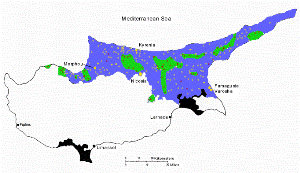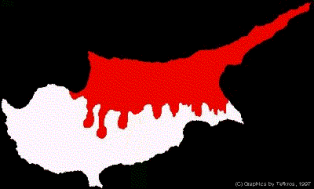by Alexander Mizan
July 20, 2009 marks the 35th anniversary of the invasion of Cyprus by Turkish troops. The American Hellenic Council was originally founded to protest the injustice that started taking place in Cyprus on that day and has continued up to this day.
During the last thirty-five years, we have seen bloodshed, refugees, the creation of the Green Line separating people who once used to live in peace together and a myriad of failed diplomatic efforts to find a solution to the problem. Despite the de-facto division of the island into the UN-recognized Cyprus in the south and the puppet state run by the Turkish military in the northern one-third of the island, Cyprus was admitted into the European Union in 2004 through a series of diplomatic arrangements that kept the status quo in place.
But why has the status quo been kept intact after all this time?
The roots of the Cyprus problem can be traced to an era very different from the one we live in at the moment. One can argue that the crisis that culminated to the Turkish military invasion had many causes. Yet, it can only be seen through the lens of the Cold War.
In 1974 the European Union did not exist and Western Europe was depended on the US nuclear umbrella to deter a "potential sweep" from the Red Army. Makarios, who at the time was president of the Republic of Cyprus, was very popular domestically. In the 1968 re-election, he received 96% of the popular vote, beating Takis Evdokas who ran on a reunification with Greece platform. Makarios, history shows, was a leader accountable to his costituents, whether they spoke Greek or Turkish.
Back in Washington, The Nixon White House was determined not to allow another Cuban Missile Crisis or another Vietnam from occuring and Henry Kissinger's Realpolitik was dominating foreign policy making. Realpolitik is a term used to describe foreign policy based solely on practical (or Machiavellian) considerations and ignoring ideological or human-rights concerns. In the eyes of Kissinger, Makarios was too independent a leader. In many ways, Makarios, just like Ho Chi Minh or Fidel Castro, sought the independence of his people from the remnants of colonial rule. Fearing a replay of history, the US National Security Advisor & Secretary of State (he held both roles in 1974!), was determined to prevent at all costs another potentially Communist state in the strategic Eastern Mediterranean.
In the meantime, in Greece, the military junta had assumed power in 1967. The junta (some argue with the encouragement of the Dept. of State and the CIA) was secretly seeking unification between Greece & Cyprus. The Junta, unpopular at home after years of repressive rule, needed a boost to its stature and secretly sought unification between Greece & Cyprus. Relations between the generals and Makarios started to deteriorate culminating in the crisis of July 1974. The Greek generals, maladvised from the State Department and without having theirs nor their Cypriot's brethen interests in mind, deposed Makarios. As a result, Turkey invaded as a guarrantor power under the pretext of "protecting" its nationals.
A few days after the invasion, the military regime in Athens collapsed and five months later, Makarios returned to Cyprus as its President until his death in 1977. Yet, the Turkish military remains an occupying force in the northern third of the island until today…
Today, ALL the reasons that led to the invasion of Cyprus by the Turkish military do not exist. Greece has a democratically elected government that has not sought, nor is seeking reunification with Cyprus. Nor does Greece present a military or demographic threat to either Cyprus or Turkey. The Soviet Union has seized to exist. The European Union is setting an example of uniting people with the power of the free markets by moving eastward. Cyprus has a thriving economy that can benefit and accommodate all its citizens, whether of Greek or Turkish nationality. Therefore, all citizens of the island stand to benefit from withdrawal of the Turkish military.
So, why has reunification and expulsion of the Turkish occupying force has still not happened ten years after Gorbachev decided not to send in the troops to East Germany? The reasons are many and interrelated. A few possible ones that come to mind:
-
Mainland Turkey's government is trying to create a new demographic status quo in the northern occupying part of the island by resettling it with people from anatolia. Such strategy benefits with the passage of time and the ultimate goal could be seeking a permanent division based on new population claims.
-
Lack of "real" Turkish Cypriot representation in the negotiations. The Turkish military is who controls the northern part of the island and they are the ones who call the shots. In return, the Turkish military is accountable to the mainland Turkish people and does not care about the interests of the Turkish Cypriots. They have no real incentive to negotiate in good faith because any reunification option would damage their own interests.
-
Inertia and/or unwillingness in the US political landscape to press the Turkish generals to compromise. This is caused by State's and Defense's need for Turkey as a strategic ally in the area coupled with lack of knowledge of the issue by Congress or US costituents.
-
Limited role of the European Union in Eastern Mediterranean strategic and security matters. Especially after the accension of Cyprus into the EU (a great missed opportunity for reunification), the EU has only one opportunity left to press for resolution of the problem and that will be when Turkey applies for membership.
-
Limited trust between the Greek Cypriot and Turkish Cypriot leadership on the island due to years of division and therefore inability to establish a united front vis-à-vis the occupying power.
As can be seen, the problems that brought about the de-facto division of Cyprus do not exist any more. The new reasons that maintain the division and prevent the withdrawal of the occupying foreign force from the northern part of the island are much easier to overcome than Cold-War considerations if only the United States governement had the will to right a wrong. Thirty-five years later, there are people who lost their lives, people who lost loved ones, people who lost property. Thirty-five years later, the Cypriot people, whether Turkish or Greek are still been done injustice for no good reason. It's never too late to right a wrong, even thirty-five years later…



















